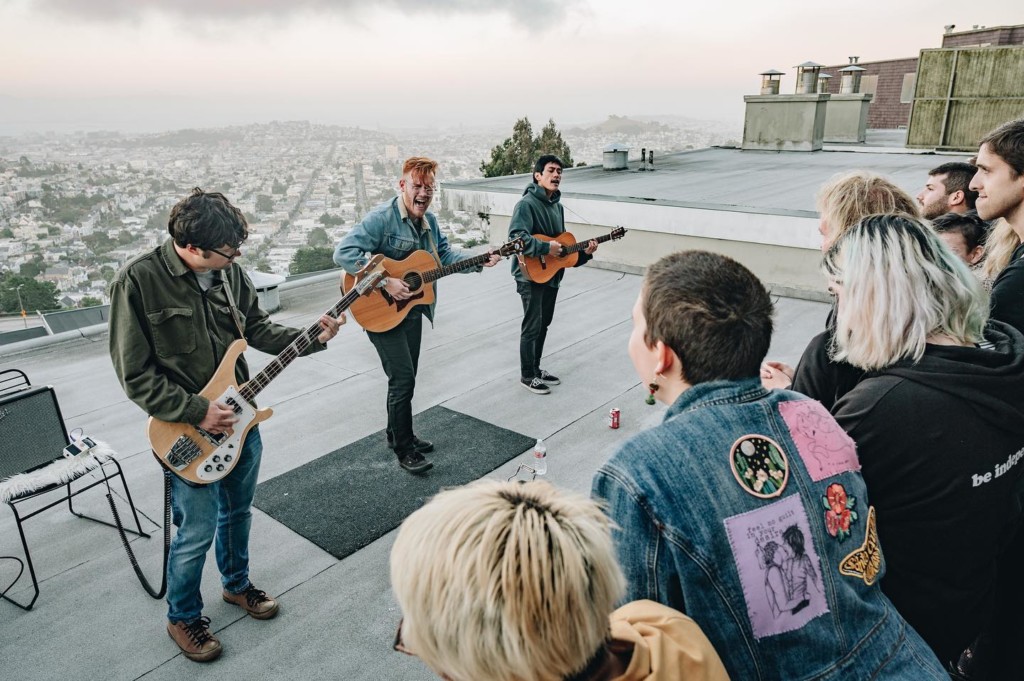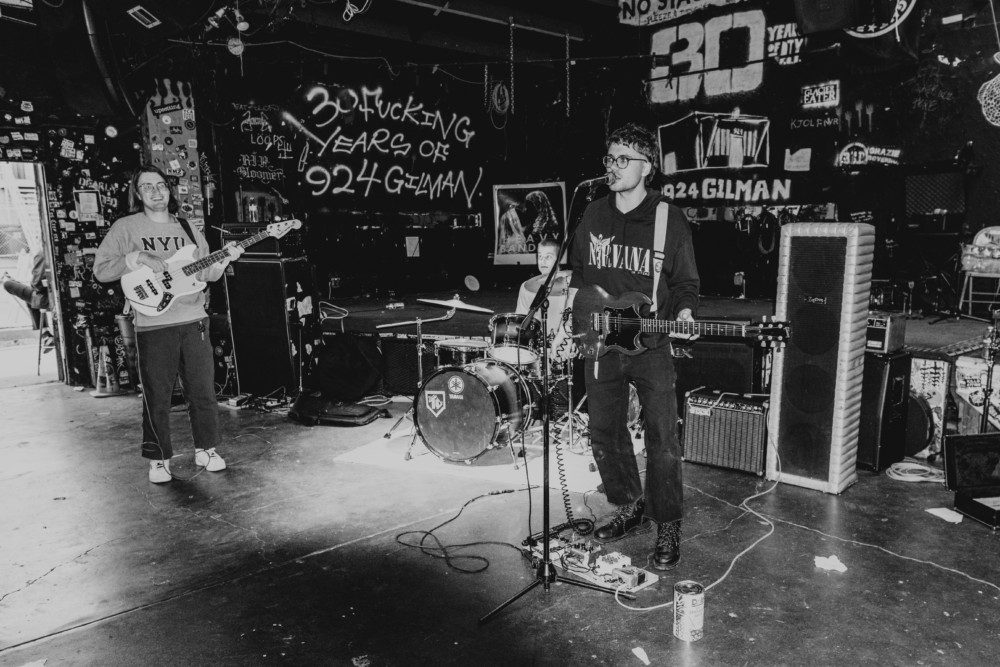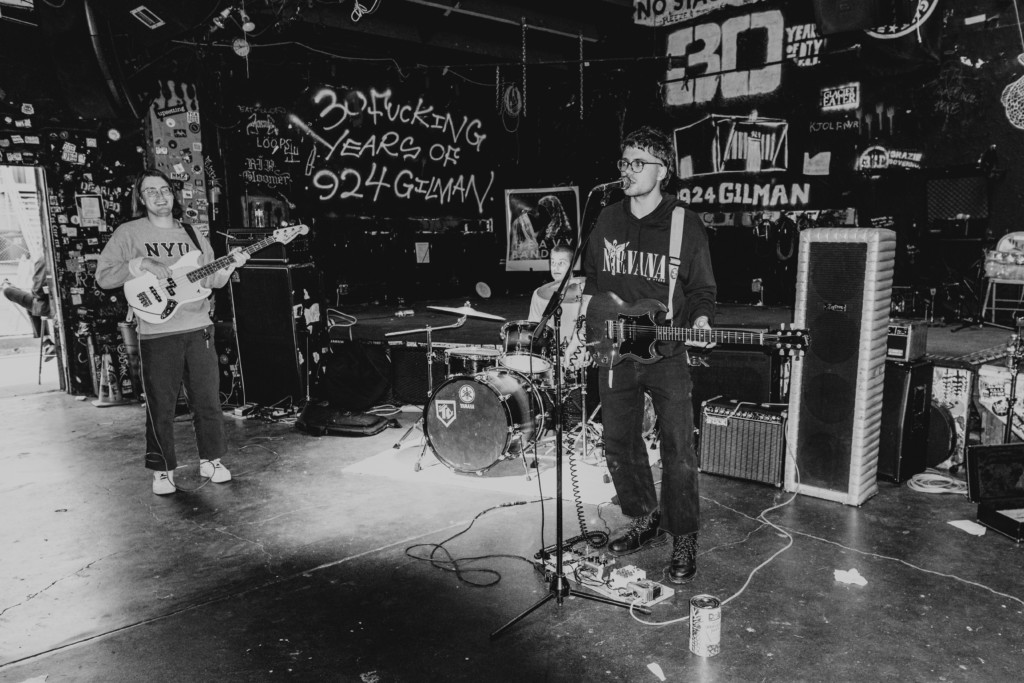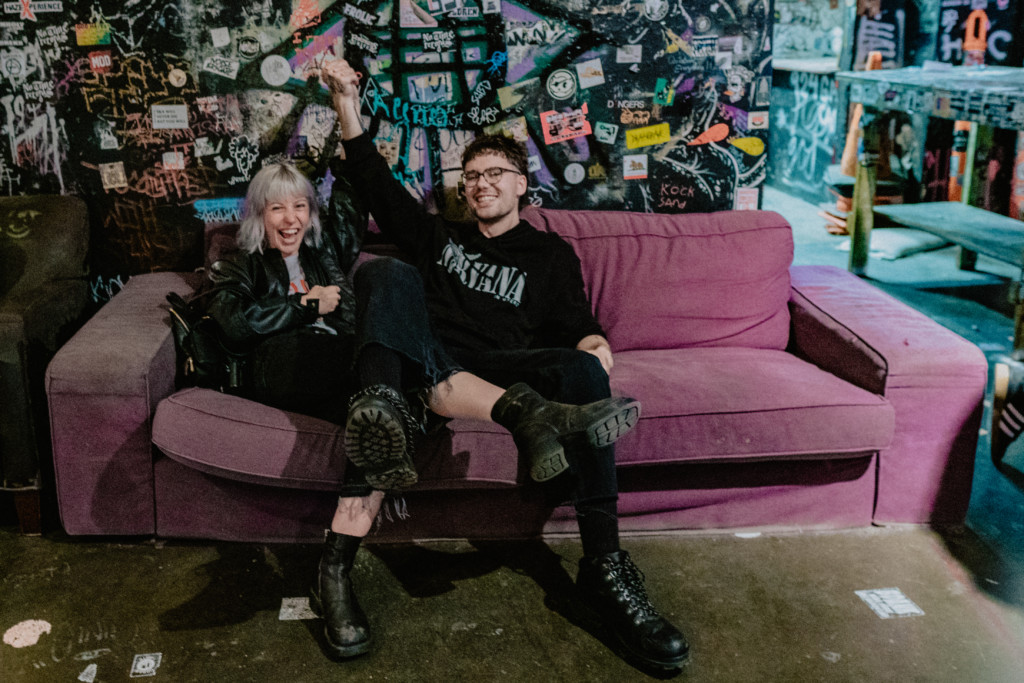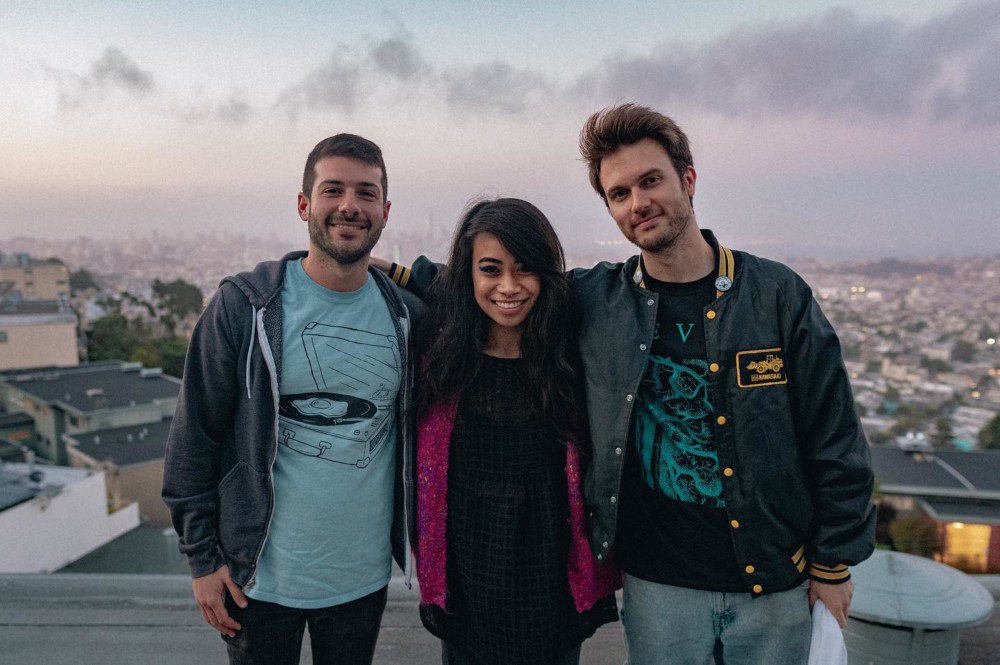
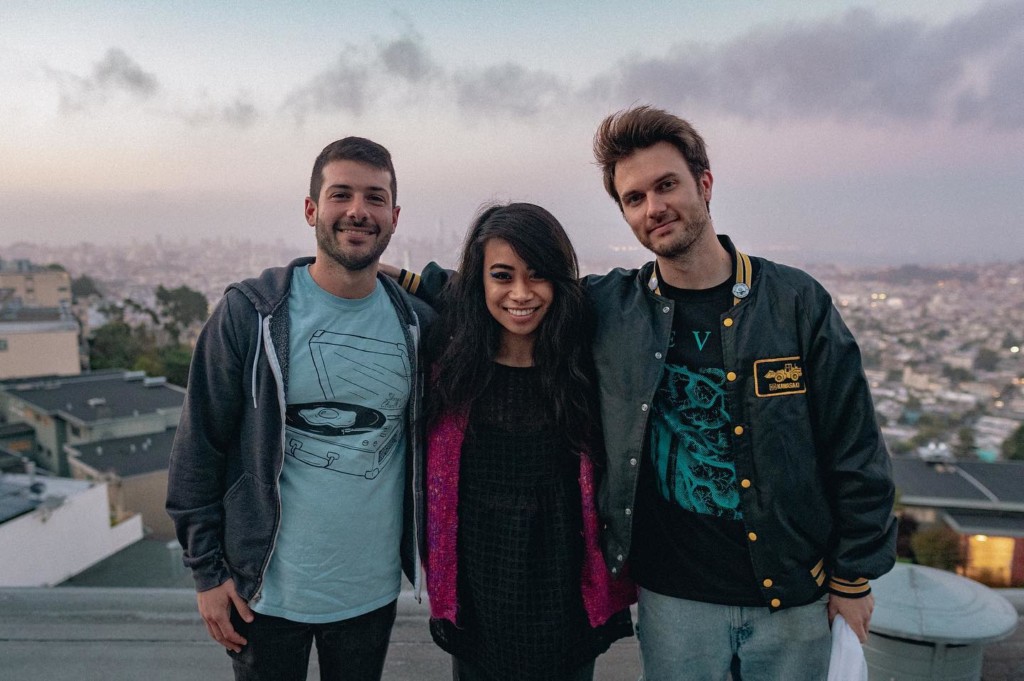
While ascending the steps to the upper level at Twin Shrieks fest, I almost knocked over someone’s plate of watermelon. “Sorry!” I mouthed into the dark, settling down to watch the next set from on high.
The plate was fitting; day one of the the two-day fest was like a punk rock cookout, with merch, artwork, and food stacked in foil wraps lining the walls, the stands cupping the performance stage like splayed hands. It was very much a family affair, occasionally in the literal sense (organizer Rianne Garrido’s parents flew up from Southern California to provide snacks and support) but also in the sense that Twin Shrieks seemed its own sort of family, the kind that gets made in the quiet by those making art, who know those making art, who know those making art of a whole other sort…
Garrido told me it had all come together quite naturally; the warehouse space for day one is normally used for theater rehearsals, so it was prepared (at least somewhat) for the likes of an audience. Day two was hosted at a tried-and-true venue, the rooftop space where the fest’s organizers host the weekly acoustic Twin Peaks Sessions. Day two was all acoustic as well, and from what I saw on Garrido’s Instagram the next day, it was all very intimate, with sets ranging from spirited one-man-shows to tinkling full-band covers.
Day one, however, was all movement and noise, a bounce house of sweat and energy emanating from the bowls of a labyrinthine West Oakland warehouse. I emerged into the performance space mid-song, giggling with my friend after walking down a eerie and bizarrely long white hallway where I half-expected to meet El from Stranger Things. Onstage was Taking Meds, a New York band on tour to promote their latest full-length, I Hate Me. Their set is what compelled me to describe the night as a “bounce house” – it was hard not to immediately get caught up in the energy of the crowd as members of the crew and the other bands bounced up and down with feverish intensity, waving phones and Garrido’s somehow magically unscathed digital camera.
My friend was particularly astonished by bassist Jon Markson, who would twist his body and face into shapes heretofore unseen by man while offhandedly doing the splits despite standard-issue punk-band skinny jeans. My friend works in theater; I would be the first to tell her that if you are looking for some physics-defying theatricality, a punk show is the place to be.
Next up was Bay Area band Damper, ending their set with a crowd-chorus of “Never Truly Satisfied,” the closer of their latest EP, All We Have to Do.
Rounding out the evening was Playing The Bay alum and Twin Shrieks headliner Kevin Nichols, who performed a handful of unreleased material, including “Disappointer” and “Barf.” “Disappointer” is a particular standout, and I look forward to comparing my live experiences of the song with the studio version. Nichols was, incidentally, also the first ever performer at Twin Peaks Sessions, so this evening was very full-circle for both him and the Festival’s organizers, who I spotted screaming his lyrics into the other side of the mike like they were collectively trying to summon a specter from the concrete ground between their feet. While I certainly expected this, it was almost (and I mean this in the best way possible) like watching a bunch of kids at a sleepover sing their favorite songs into a improvised mic — only this time, your favorite songs have been created by your friends.
No surprise to me why Nichols is still so happy he moved to the Bay.
I talked to Twin Shriek’s organizers – Mike Donnelly, Jon Abrams, and Rianne Garrido – for some more insights on the process, lessons learned, and what’s next for Twin Peaks Sessions.
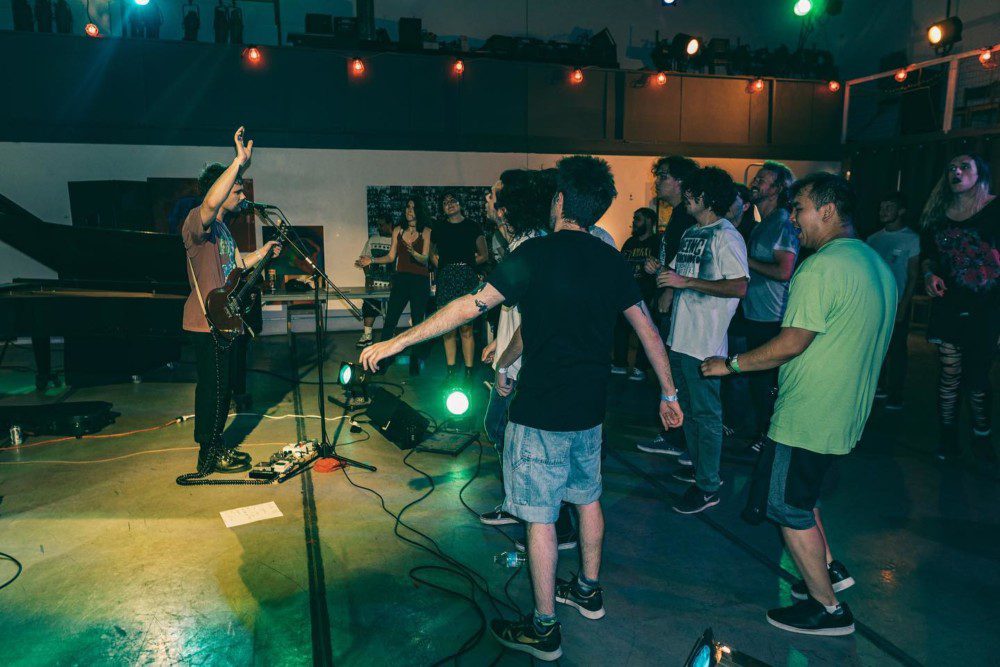
AF: What was the inspiration for the fest?
MD: While we’ve been hosting our acoustic Twin Peaks house shows, we slowly began branching out to other venues that allow for full bands (amps, drums, and an actual PA!). In the back of my mind I always wanted to put on something bigger than your standard 2-3 band bill, involving diverse acts, local art vendors, and the most important of all — community. We love to bring people together.
We drew inspiration from major punk festival Riot Fest in Chicago, but more realistically, fests such as Fest in Gainesville, Florida, and the handful of day-long DIY fests Rianne and I attended during our visit to Austin’s “unofficial” SXSW shows. These DIY fests (put on by The Alternative, DIY Tour Postings, and more) ranged from taking over a dive bar to someone’s backyard. I’ve lately taken on the mindset of “anything can be turned into a music venue,” and my mind was racing as to what we could do with [the project we] dubbed as Twin Shrieks.
The approach going into this was to find a safe, all-ages and somewhat “underground” venue for day one where we would allow for full bands, knowing day two we would simply wind down acoustically at our usual Twin Peaks spot. When we stumbled upon a rad, safe, for-rent warehouse space in West Oakland, we went all in with planning.
The biggest inspiration for the fest was the musicians and artists we’ve met along the way in doing Twin Peaks Sessions. The amount of talent in the Bay Area is massive and we wanted to host an event that celebrates the creativity of our local community.
AF: What were your biggest challenges organizing the event and what do you wish you had known ahead of time?
MD: The biggest challenge was time management, and planning out an itinerary for a space we never used, a space that upon arrival would be totally empty and we’d have to set up from scratch (in a one hour window). I wish I mapped out everything ahead of time (vendor tables, more advanced stage plot) and also gave numerous people job responsibilities during setup. Setup, with the help of some KICK ASS volunteers, ended up going well, and music started right on time. The first two hours were the biggest stressors but we communicated and moved to get it all sorted out!
RG: None of us have had any prior experience in organizing an event of this scale so we went into planning with full caution and attention to detail. We quickly learned the importance of setting up an efficient ticket sales/RSVP system to a well-timed load in, consistent communication with all participants, recording expenses, food prep, and everything in between. We met every week to make sure we covered all bases and tracked everything in an all-encompassing spreadsheet. We’re huge fans of a good ‘ol spreadsheet!
JA: It wasn’t necessarily our intention to make any money from it, but we did want to have a sense of expenses versus profits to help plan for future events. We did a pretty good job keeping tabs on what we spent and what we made, but we’d make some changes in the future to streamline that process. The sustainability of events like this unfortunately can live and die by the money.
AF: What were your favorite parts about organizing?
MD: I love forming a bill — for Twin Shrieks, getting to form a nine-band bill day one, and seven bands day two… oh the joy!
RG: Seeing and experiencing the behind-the-scenes of what it takes to put on a festival really made me appreciate the hard work that went into previous festivals I’ve attended. We loved seeing the support on social media from all of the musicians and artists in the time leading up to the festival. Hosting this festival truly became a community effort and we’re really grateful to everyone who took part in it (bands, artists, volunteers and attendees) — you helped make it happen!
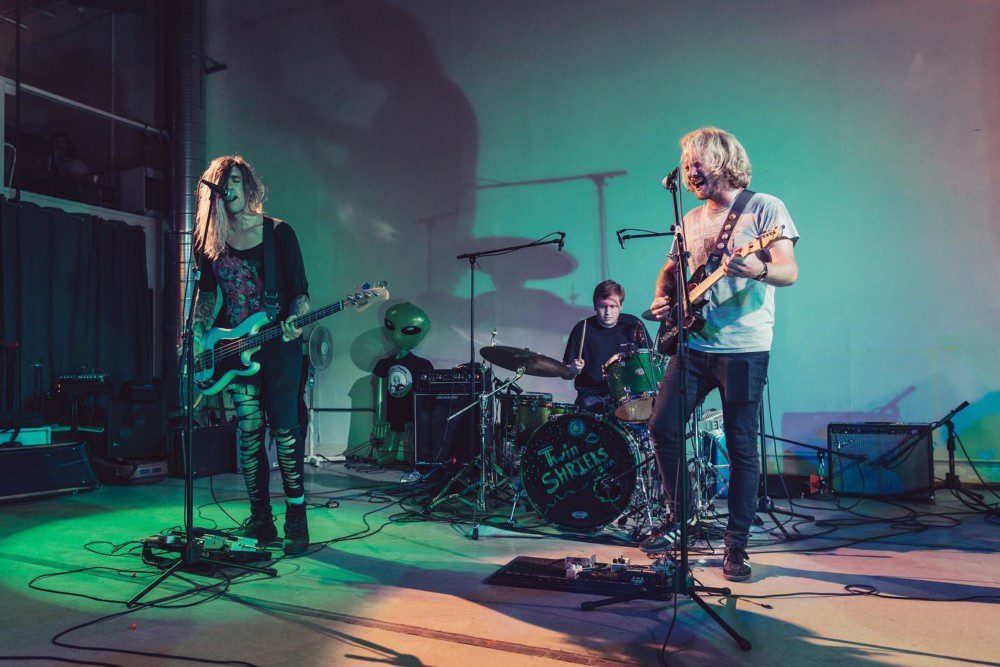
AF:What was your favorite part of the actual fest?
MD: My favorite part was once all was set up and things began to run themselves (shoutout to Gabe on sound, who totally ran the show between acts and during) it allowed us to really rock the heck out during sets! Getting to stop by each merch table, check in with vendors, and most importantly check in with the attendees who were having so much fun while discovering new music. I loved to see people getting merch from bands they did not know of a half hour prior.
RG: Shows have always had a special place in my heart for giving me a space to feel safe and welcome. Putting on this festival was a great reminder as to why I have such a big love for this community. The feeling of being surrounded by like-minded individuals who share a genuine appreciation for music and the arts gives me immense joy. The sense of camaraderie in the room was so tangible — I can’t even begin to describe it! I owe so much of my personal growth to the music scene, and to help host an event that aspires to provide the same inclusive space it did for me growing up was such a humbling and rewarding experience. The most memorable moment for me was having my parents there helping serve the food. They were gushing afterwards saying they felt so loved by everyone who came. My mom summed it up best when she used three words to describe everyone who took part in it — wholesome, humble and appreciative. I couldn’t agree more.
JA: Seeing everyone have such a great time! And seeing all these different people we had met in various different contexts all together in the same room, some who knew each other already, some meeting each other for the first time. Community! And also being able to play on the bill alongside a ton of amazing bands that we love and have a ton of respect for.
AF: What is a question you wish you were asked more often?
We wish our community would always feel comfortable reaching out to us for help in any regard. Whether it be music related/getting a venue situation sorted out, or even in other significant areas such as mental health, we’re happy to lend a hand and also be there to listen. The strength and longevity of this community depends on taking care of the people in it, and our aim is to support anyone the best we can.
AF: What’s next for Twin Peaks Sessions?
We will continue dropping recorded sessions on our YouTube page each Thursday, and host a couple house shows a month. We will continue branching out to other venues as well, getting exposure as bookers who help touring bands and locals pick up gigs and form bills. Oh, and Twin Shrieks 2020 planning has already begun!
